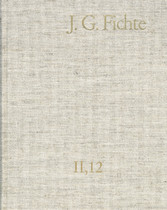Suchen und Finden
Service
Johann Gottlieb Fichte: Gesamtausgabe / Reihe II: Nachgelassene Schriften. Band 12: Nachgelassene Schriften 1810-1812 - Gesamtausgabe der Bayerischen Akademie der Wissenschaften
Mehr zum Inhalt

Johann Gottlieb Fichte: Gesamtausgabe / Reihe II: Nachgelassene Schriften. Band 12: Nachgelassene Schriften 1810-1812 - Gesamtausgabe der Bayerischen Akademie der Wissenschaften
Einleitungsvorlesungen an der neu gegründeten Universität Berlin und Vorlesungen über die >Tatsachen des Bewußtseins< aus dem Wintersemester 1810/11 führen vom Standpunkt des gewöhnlichen Bewusstseins auf die Ebene der Wissenschaft. Die hier erstmal gedruckte >Wissenschaftslehre von 1811< geht vom Gedanken des Seins als dem Absoluten aus und destruiert am Beispiel Spinoza/Schelling' /> den Versuch einer ontologischen Philosophie. Ein letztes Mal hält im Sommersemester 1811 Fichte populäre Vorlesungen: >über die Bestimmung des Gelehrten<. Den Band beschließt ein Gutachten Fichtes zu einem ihm vom »Turnvater« Jahn vorgelegten Satzungsentwurf für die deutschen Burschenschaften. This volume begins with Fichte's Introductory Lectures to his first official course at the newly established University of Berlin, beginning in the Fall of 1810. These are followed by lectures from the Winter Semester of 1810/11 on The Facts of Consciousness, which, in Fichte's later period, served the function of leading one from the standpoint of ordinary consciousness to the level of science, thereby replacing the earlier (>Platner<) lectures on Logic and Metaphysics. The >Wissenschaftslehre< of 1811 is here published for the first time. This version of the >Wissenschaftslehre< begins with the thought of the highest possible form of being, i.e. the absolute, and, using Spinoza and Schelling' /> as examples, demonstrates the impossibility of establishing any ontological philosophy. A final example of Fichte's »popular« lectures is furnished by the manuscript of his lectures from the Summer Semester of 1811 >Concerning the Vocation of the Scholar<. This volume also includes an Address delivered in conjunction with the promotion of new professors (February 1811) and Fichte's Reflections on the rectoral election of 1811. Fichte's social activities during the years 1811/12 are documented by some doggerel verses he delivered when he became speaker of the >Christian-German Social Club< (Tischgesellschaft) and a record of a meeting of the same. This volume concludes with Fichte's recommendation of a proposal put forward by »Turnvater« Jahn concerning the establishment of the German student fraternities.
Alle Preise verstehen sich inklusive der gesetzlichen MwSt.






